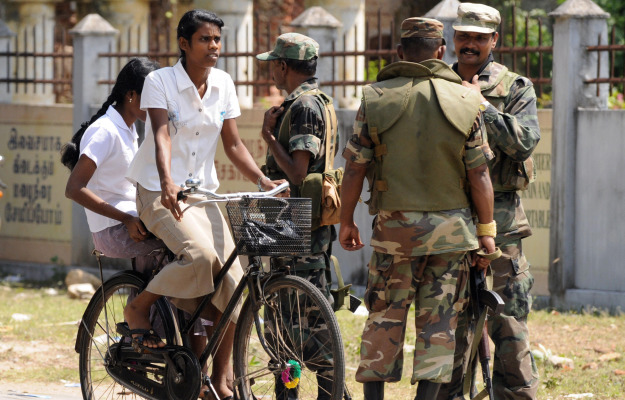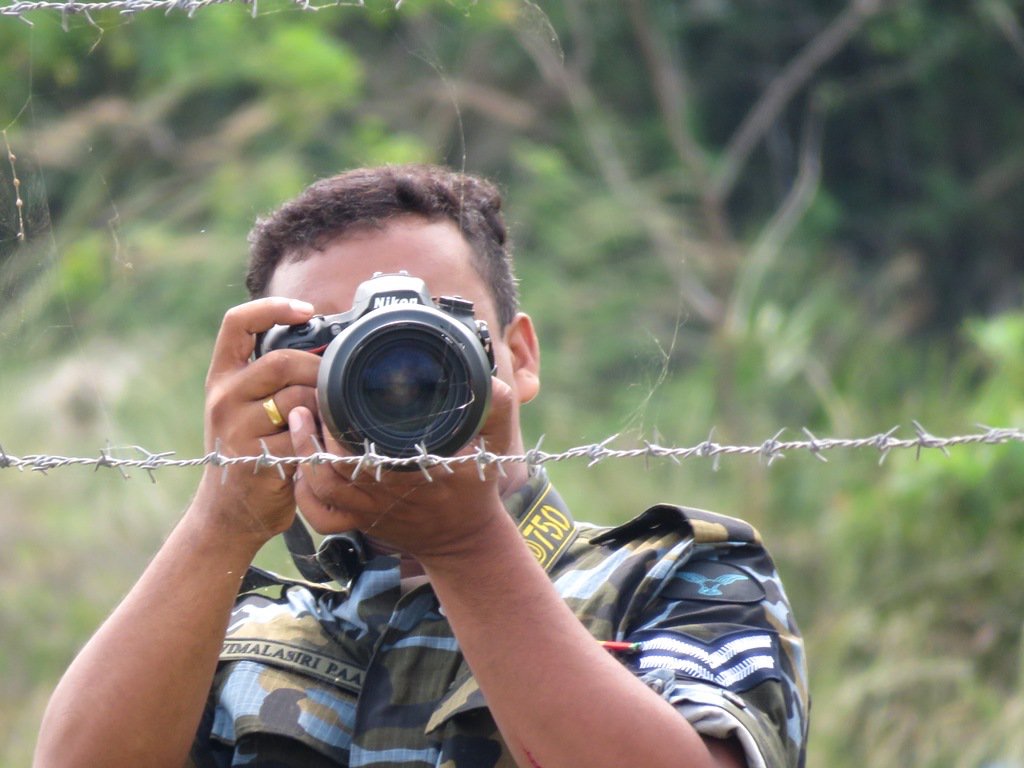
File photograph: Sri Lankan soldiers carry out surveillance in Jaffna.
Sri Lanka’s Ministry of Defence has declared that all marriages between Sri Lankan citizens and foreigners will now require military approval, sparking fears across the more than million-strong Tamil diaspora over its ties to the homeland.
“The Sri Lankan immigration process is already something that we all know as something tedious and time-consuming,” said Mohan*, a US citizen. His older brother was due to get married in Jaffna in 2021.
“We applied for a fiancé visa more than a year before their wedding was to take place,” he added. “Any additional screening would only slow the process down further to no avail.”
The new law, which came into effect on January 1, 2022, will do precisely that. It requires all foreign nationals who are seeking to marry Sri Lankan citizens to obtain a “Security Clearance Report”. An in-depth health declaration must also be submitted to the military, with details ranging from HIV status to any history of kidney disease.
The Sri Lankan military insists that the new measures are for “national security” purposes.
“We have seen some foreigners wanting to marry Sri Lankans here with ulterior motives like engaging in drug trafficking and money laundering,” claimed Registrar General W.M.M.B. Weerasekara. “We want to make sure those foreigners who want to marry locals here are not involved in such activities.”
Lt. Col. Nalin Herath, the Defense Ministry's media director, meanwhile told Nikkei Asia that the new measure was aimed at “criminal activities”, including “terrorism”.
It is precisely that broad evocation of “terrorism” that has sparked fears not just on the island, but around the globe, where more than one million Tamils who originate from the North-East currently live.
“With so many of us having fled the island and living dispersed around the world, homeland-diaspora marriages have been common in the Eelam Tamil community for more than 30 years,” said Veena*, a British citizen who married a Sri Lankan citizen in 2018.
“This new policy is a terrifying overreach by the Sri Lankan state, and an obvious attempt to expand its surveillance of diaspora Tamils, which we know it already mandates through its foreign missions.”
Infiltrators and informants

Sri Lankan soldiers photographing Tamil protestors as part of a surveillance, 2017.
Sri Lanka’s hostility towards Tamils, particularly the Tamil diaspora, is already well documented. In 2021, a landmark decision from a British tribunal found that Tamils who engage in a range of political activities in the United Kingdom may continue to face “a real risk of ill-treatment or harm” if deported to Sri Lanka.
The ruling revealed how the Sri Lankan state, through its foreign embassies, infiltrates and extensively monitors Tamil diaspora groups.
“Infiltrators, informants, and other forms of surveillance such as taking photographs at demonstrations,” were deployed by the Sri Lankan state to monitor Tamil diaspora activity, said analyst Dr Chris Smith, who gave evidence to the Tribunal. “All such intelligence is sent back to the Ministry of Foreign Affairs and then on to relevant intelligence sections within the State Intelligence Service (SIS), Terrorism Investigation Division (TID), Criminal Investigation Department (CID), and the Ministry of Defence.”
Quoting a source within the SIS, Dr Smith went on to state that there was an electronic database, which underlies Sri Lanka’s ‘stop and watch lists’ and contains many thousands of names. “That database can be consulted at the airport and, if appropriate, an individual could be handed over to the SIS, the TID, or the CID,” he noted. “The information contained on the electronic database remains in place for life.”
Read more here: How a landmark British ruling may save Tamil activists from deportation to Sri Lanka
Given the extensive surveillance of the Tamil diaspora, protests have taken place around the world, including in Germany and Australia, highlighting the risk that Eelam Tamils face on the island.
Sri Lanka’s latest declaration has further compounded those fears.
“Even as a British citizen, I doubt I would have submitted to such invasive screening in order to marry my partner, given Sri Lanka’s targetting of those connected to the diaspora,” continued Veena. “Many transnational marriages involve recent refugees, whose families are much more vulnerable to surveillance and intimidation.”
For many, the move also further seeks to isolate the homeland and break down ties with the diaspora.
Any engagement with the homeland is already subject to intense military scrutiny, and several Tamil diaspora organisations remain banned in Sri Lanka. The government again claims that they pose a threat to “national security”.
“To our family, this alliance did not solely arrive with a happy wedding and a union of two families,” added Mohan. “It also came with the dangers of travelling to Sri Lanka, a country whose government we fled from in fear of our lives, after 30 or so years.”
"We spent weeks pondering whether we should make this trip amidst the pandemic and facing the security forces that we know are responsible for killing and disappearing people who spoke the same language as us."
Creeping into the bedrooms of citizens
The move from Sri Lanka’s all-powerful ministry of defence comes amidst intensifying militarisation across the island.
Sri Lanka’s armed forces already stands at one of the largest per capita, with a mammoth defence budget that continues to grow despite almost 13 years since the end of the armed conflict and a worsening economic crisis.
The current regime however, led by accused war criminal president Gotabaya Rajapaksa, shows no signs of abating its militarisation, with senior military officials promoted to government posts and an ever-expanding role for the military.
“On a far more serious note, enabling the military to creep into the bedrooms of Sri Lankan citizens… is no chance aberration,” wrote K P Jayawardene in the Sunday Times.
“This absurd idea by the Sri Lankan Government collapses the State, the Defence Ministry and the health regulator into one, effectively negating any distinction between any one or the other. That is the very intent behind the move, in other words, this is yet another step in the journey towards obliterating civil governance.”
“That social contract between the ruler and ruled is increasingly void in Sri Lanka’s militarized regime structure,” added Ranga Jayasuriya in the Daily Mirror.
Rajapaksa has himself come under fire for the move. "The entire first family, including [the president's] wife, son, daughter-in-law and grandchild, are all American citizens,” said Tamil National Alliance MP Shanakiyan Rajaputhiran Rasamanickam. “Even the finance minister, Basil Rajapaksa, who is the president's brother, is a dual citizen. So, why these double standards?”
"Fortunately, my brother and sister-in-law were married a few months before this mandate came in," said Mohan. "However for those who are planning to do the same, this is yet another frightening barrier."
_____
*Names changed on request to protect identities and safeguard families in Eelam.
